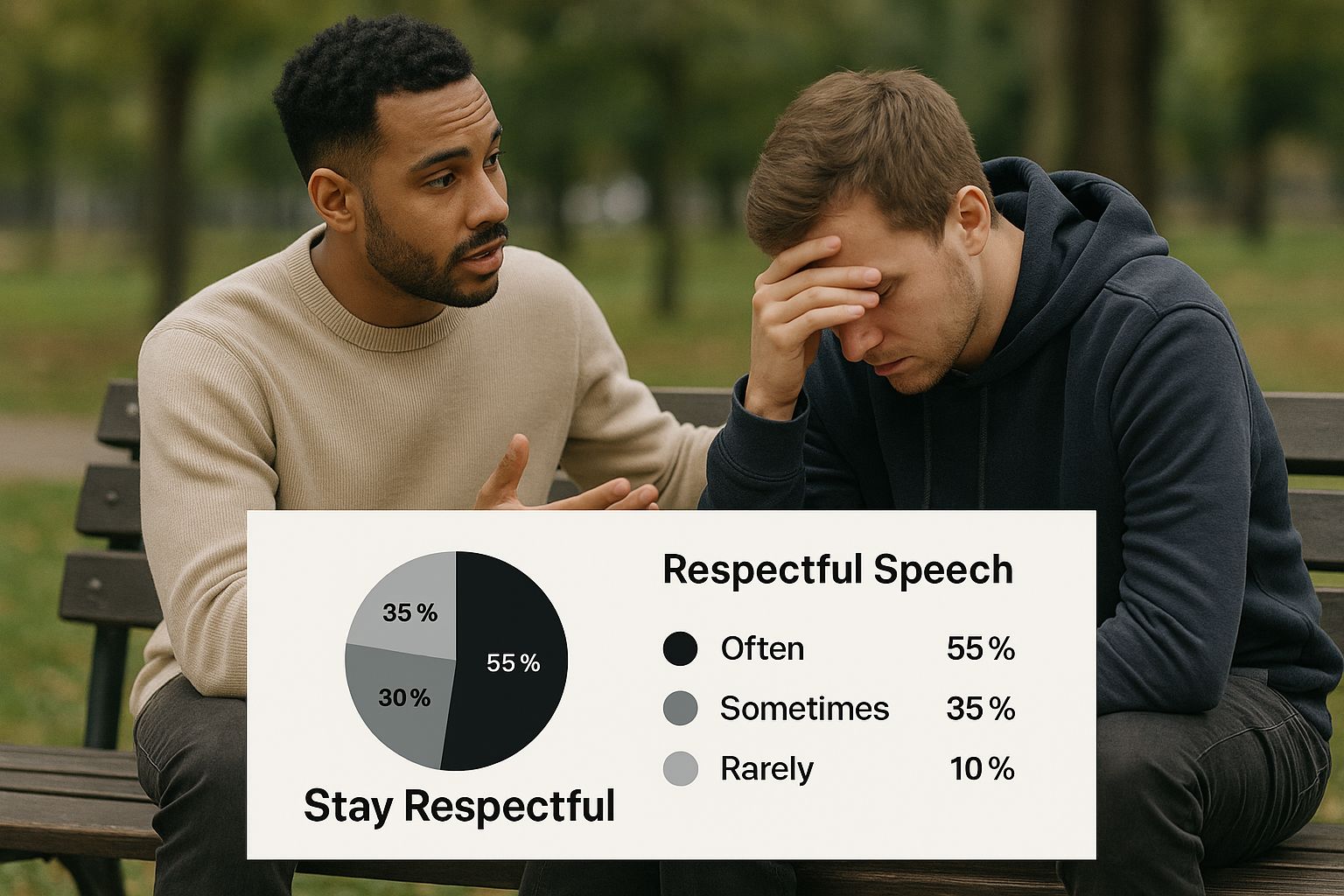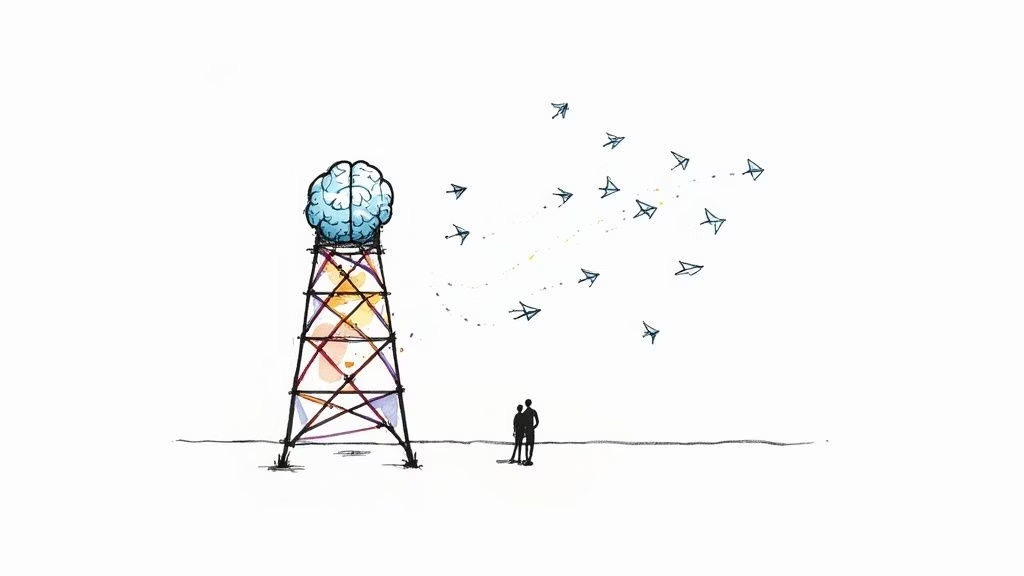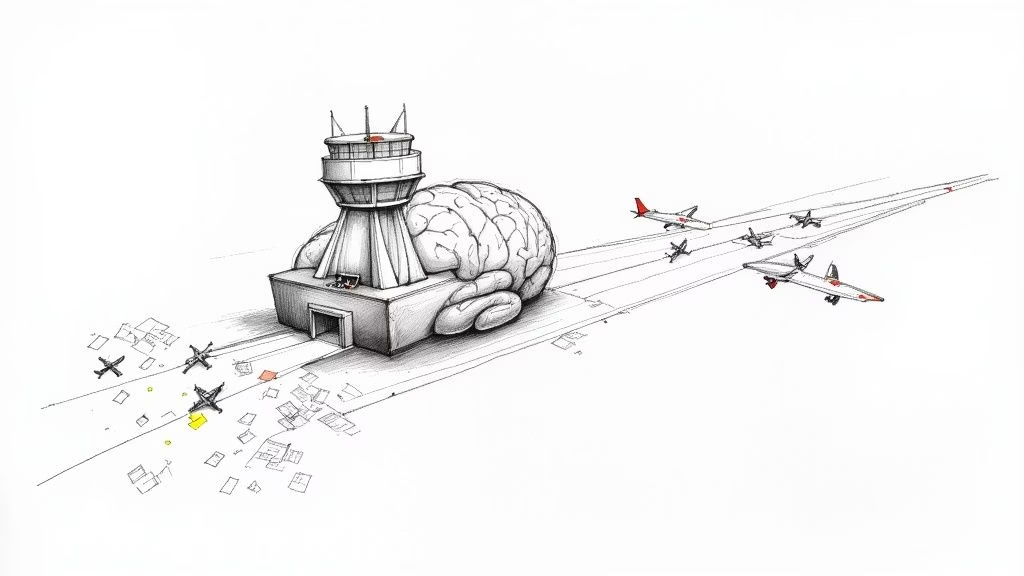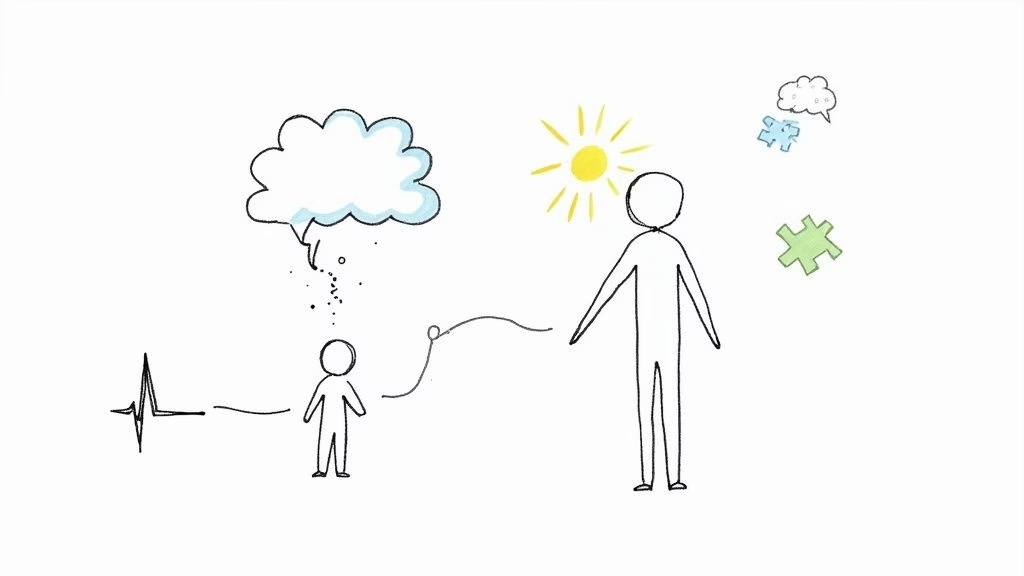Learning how to set boundaries with your friends is one of the most powerful acts of self-respect you can practice. But let's be real—it often feels impossible. It’s all about communicating your limits to protect your time and emotional energy so your friendships stay healthy and balanced. Get this right, and you’ll avoid the burnout and resentment that can poison even the best connections.
Why Is Setting Boundaries So Damn Hard?
Telling a friend ‘no’ can feel like a high-stakes emotional gamble. Just thinking about it can bring on a wave of anxiety. You start worrying about hurting their feelings, coming across as selfish, or maybe even losing the friendship entirely. If you feel this way, you're not alone. Those feelings are completely normal and come from a deep-seated desire to keep our connections strong.
This inner tug-of-war is often made worse by guilt. So many of us were taught to put others' needs first, so when we finally do something for ourselves, it feels like we're rejecting them. This gets even more complicated if you're prone to relationship anxiety. If that sounds familiar, learning more about dealing with relationship anxiety can give you some incredible tools to work with.
The Friendship Recession Factor
The social landscape today adds another layer of pressure. Since 1990, the percentage of U.S. adults who say they have no close friends has quadrupled to 12%. This trend, sometimes called the 'Friendship Recession,' makes every friendship feel that much more precious—and raises the stakes when conflict comes up.
Boundaries aren't walls you build to push people away. They are the essential guidelines that teach others how to respect and value you, making friendships healthier and more sustainable in the long run.
It’s Time to Reframe Your Mindset
The key here is to completely shift your perspective. A boundary isn't about rejecting your friend; it's about affirming your own needs. Think about it: weak boundaries almost always lead to resentment and burnout, which are far more toxic to a friendship than one honest conversation will ever be.
Let's break it down:
- Without boundaries: You say 'yes' to everything, leaving you drained, irritable, and unable to show up as your real self for anyone. This can tank your motivation for school and make you procrastinate on your own goals.
- With boundaries: You protect your energy. This allows you to be a more present, engaged, and supportive friend when you do connect.
When you start seeing boundaries through this lens, they stop being a source of fear and become a tool for mutual respect. This is the foundation for building friendships that don't just last, but actually feel good.
How to Identify Your Personal Boundaries

You can't communicate a boundary you haven't defined for yourself. It’s impossible. Before you can ever have a conversation with a friend about your limits, you have to turn inward and figure out what those limits actually are. It all starts with building a clear internal map of your needs.
And you're not alone in this. A recent survey showed that nearly 4 in 5 Americans (78%) were actively trying to set healthier boundaries. It’s a huge focus for people right now, all aimed at protecting their time and prioritizing self-care. It’s a vital step, and it starts with getting honest with yourself. For more insights on this, thrivingcenterofpsych.com has some great resources.
Tune Into Your Emotional Cues
Your feelings are your best data. Seriously. Emotions like resentment, exhaustion, or irritability are usually the first signs that a boundary has been crossed. Think of them as your personal alert system going off.
For example, do you feel that knot in your stomach when a certain friend’s name pops up on your phone? That’s a cue. Do you feel completely drained after hanging out with them, like you need a nap just to recover? That’s another one.
Paying attention to these signals is the very first step in figuring out where your energy is leaking. When you ignore them, it almost always leads to burnout, which makes it ten times harder to focus on school or anything else that actually matters to you.
Connect Feelings to School and Motivation
Weak boundaries don't just stay in your social life—they bleed into everything, especially your schoolwork and personal goals. When you’re always available to everyone else, acting as the 24/7 therapist or the go-to person for every single crisis, you’re spending energy that you desperately need for yourself. This emotional drain is one of the biggest, yet most overlooked, causes of procrastination.
It's simple math, really. If you pour all your mental energy into a friend's latest drama, you’ll have nothing left for that history essay. Your motivation tanks because your internal resources are completely depleted.
Protecting your time and energy isn't selfish. It's a critical strategy for doing well in school and actually growing as a person. If you want to get better at expressing these needs, you might find our guide on improving https://andrewpetrillolifecoaching.com/teen-communication-skills/ helpful.
A boundary is your personal energy currency. When you let others overdraw from your account without permission, you're the one who ends up emotionally bankrupt.
Practical Self-Assessment Questions
To get started, grab a journal or just open a notes app. Spend some real time with these prompts and be honest. No one else needs to see these answers but you.
- Who makes me feel energized vs. drained? Make a list of your friends and think about how you genuinely feel after you interact with each of them.
- When do I feel resentful? Get specific. Is it when a friend cancels last-minute, again? When they only ever talk about themselves? Pinpoint the exact behavior that triggers that feeling.
- What activities protect my mental health? This could be alone time, studying, a hobby you love. Are your friendships getting in the way of these essential things?
- Where do I feel pressure to say 'yes'? Think about the requests you agree to out of guilt or fear of their reaction, not because you actually want to.
Answering these questions helps you go from a vague feeling of being overwhelmed to a crystal-clear understanding of your specific limits. That clarity is the foundation you need to set firm, kind, and effective boundaries with your friends.
Communicating Your Needs With Confidence and Kindness
Knowing your limits is the first step. Actually voicing them? That’s where the real work begins. This is the moment you turn that quiet self-reflection into real-world action. And the goal isn't to build a wall around yourself. It’s to communicate your needs with a blend of confidence and kindness that actually makes the friendship stronger.
A huge piece of this is building confidence in your right to have those limits in the first place. When you feel secure that your boundaries are valid, the conversation stops feeling like you're asking for permission and starts feeling like you're just stating your reality. It helps you stay grounded, even if your friend’s reaction isn't what you expected.
This is all about being firm without being unkind. Your tone matters just as much as your words.

Respect is the foundation. When you approach the conversation from a place of care for both yourself and your friend, you’re setting the stage for a positive outcome.
The Power of the 'I-Statement' Framework
One of the best tools I've ever come across for these conversations is the "I-statement." It’s so simple, yet it completely shifts the dynamic from blaming your friend to just expressing your own experience. It’s a game-changer for parents trying to guide their teens through social drama because it teaches them to own their feelings without pointing fingers.
The structure is beautifully straightforward: I feel X when Y happens, and I need Z.
- "I feel…" starts with your emotion, and nobody can argue with how you feel.
- "…when…" describes a specific, objective behavior—no exaggeration.
- "…and I need…" offers a clear, actionable solution or request.
This little formula keeps your friend from getting defensive, which is usually what sends these talks off the rails. You’re not attacking them; you’re inviting them to see things from your side.
True boundaries are about protecting your energy and well-being, not controlling others’ behavior. When you use “boundaries” to punish or manipulate, you’re engaging in harmful patterns disguised in healthy language.
A Look at Some Real-Life Friendship Scenarios
Let's put this framework into practice. Teens are constantly navigating friendships that can mess with their school motivation or fuel procrastination. Here’s how these conversations can go.
The table below breaks down a couple of common situations, showing how a simple shift in language can make all the difference. Using "I-statements" turns a potential argument into a productive conversation.
Effective vs Ineffective Boundary Communication
| Scenario | Ineffective Language (Blaming) | Effective Language (Using 'I-Statements') |
|---|---|---|
| The Friend Who Constantly Vents | "You call me way too much and just dump all your problems on me. It's exhausting." | "I feel overwhelmed when we have long phone calls late at night because I lose motivation for my homework. I need to keep our weeknight calls shorter so I can focus on school." |
| The Friend Who Pressures You to Go Out | "Why are you always trying to make me go out? You don't care about my grades." | "I feel anxious when I go out the night before a test because I get worried about being unprepared. I need to stay in and study tonight so I can feel my best." |
See the difference? The effective examples focus on personal feelings and needs, not the other person's perceived flaws. This method teaches teens invaluable skills in emotional regulation and clear communication—skills that are absolutely essential for their mental health and future success.
Resources for Teens and Parents
Let's be honest, these conversations can be tough. It really helps when parents model this kind of communication at home. Talking openly about boundaries shows teens that it's a normal and healthy part of all relationships, not just friendships.
If you’re looking for more support, these organizations have some fantastic resources:
- The Jed Foundation: Offers a ton of mental health resources created specifically for teens and young adults.
- Child Mind Institute: A great source for expert articles and guides on everything from teen psychology to friendships.
Learning how to set boundaries is a skill. It takes practice, and you won’t always get it right. But mastering it leads to healthier, more respectful relationships that support your well-being and help you thrive in every part of your life.
How to Handle Reactions and Maintain Your Boundaries

Communicating a boundary is a huge step, but honestly, it’s only half the battle. The real test often comes right after you’ve said the hard thing. Holding your ground when a friend doesn't react the way you hoped requires calm, consistency, and a deep well of self-respect.
Your friend might get it immediately, or they might seem confused, get defensive, or even get angry. Remember this: their response is about them, not you. Your only job is to stay firm in what you need while still being a compassionate friend. A healthy friendship might wobble for a minute, but it will eventually find its footing and respect your limits.
Navigating Different Responses
It helps to know that people see boundaries differently. For example, 42% of adults under 30 think it’s okay to ask a friend to change their behavior, but only 25% of people over 65 feel the same way. This kind of generational gap, highlighted in research by YouGov, shows that a friend might push back simply because their idea of what’s acceptable is wired differently than yours.
When you get pushback, the goal is to avoid getting dragged into a debate.
- If they seem confused: Calmly explain your boundary again, but keep it simple. You don't need to write a ten-page essay justifying your feelings. Your need is reason enough.
- If they get defensive: You might hear something like, "Wow, I'm not that bad." Try not to take the bait. Gently bring it back to your need: "This isn't about you being 'bad.' This is about what I need to feel good."
- If they get angry: Anger is usually a signal to press pause on the conversation. You can say, "I can see this is upsetting you. Let's talk about it later when we're both calmer."
Learning to do this is a massive part of growing up. For more support on navigating these conversations, our guide on essential social skills for teens can help.
Their reaction is information about them, not a judgment on your boundary. A healthy friendship can withstand a difficult conversation; an unhealthy one might not, and that’s a painful but important discovery.
Strategies for Staying Consistent
Maintaining a boundary is a practice. It can be emotionally draining, especially when you really care about the friendship. But your consistency is what teaches people you’re serious.
One of the biggest places this shows up for teens is school. Let's say a friend repeatedly ignores your boundary about needing quiet time to study. That directly messes with your motivation and can even fuel procrastination. Each time they push, you have a choice: reinforce the boundary or let it slide.
Every single time you reinforce it, you're making an investment in your own well-being and your grades. It's a true act of self-care, and it pays off in every part of your life.
A Guide for Teens and Parents on Healthy Friendships
Teen friendships can feel like a complicated dance, and that goes for everyone involved—teens and parents alike. Figuring out how to set boundaries with friends isn't just about dodging drama. It's about building resilience, protecting your mental health, and making sure your relationships are a source of support, not stress.
For parents, your role here is massive. One of the best ways to teach your teen about healthy boundaries is to live them out yourself. When they see you protecting your own time and energy—maybe by politely saying no to an extra commitment or clearly communicating your needs at home—they learn that it's a normal, healthy thing to do.
Tips for Parents
The most important thing you can do is create a safe, non-judgmental space for your teen to talk. They have to know they can come to you with friendship problems without getting a lecture or a quick-fix solution.
- Listen More Than You Talk: Honestly, sometimes they just need to vent. Let them get it all out before you jump in with your two cents.
- Ask Open-Ended Questions: Instead of asking, "Why do you let them treat you like that?" try something like, "How does it feel when that happens?" This pushes them toward self-reflection instead of defensiveness.
- Spot the Red Flags: Pay attention. Does your teen seem consistently drained, anxious, or irritable after hanging out with a certain friend? Those are huge signs of a one-sided or unhealthy dynamic.
- Validate Their Feelings: Simple phrases like, "That sounds incredibly frustrating," or "I can see why you feel so overwhelmed," show you're on their side and builds trust.
The bottom line is teaching your teen that their mental well-being comes first. A real friendship should add to their life, not constantly drain their energy, motivation, or focus.
Advice for Teens
Juggling friendships with school, social media, and your own mental health is a lot. Learning how to protect your energy is a skill that will serve you for the rest of your life. When your boundaries are weak, it can absolutely tank your motivation and fuel procrastination because you're just too emotionally exhausted from dealing with friend drama.
You don't have to be on call 24/7. It is 100% okay to turn off your phone, block out time to study, or just say, "Hey, I can't talk right now, I need some time for myself." These small moves reinforce your limits and teach friends how to respect your needs.
Finding Balance and Getting Support
The pressure to be constantly connected is real, but your responsibilities to yourself—like schoolwork and self-care—are just as important. If a friendship is consistently causing you stress or anxiety, that’s a clear sign something needs to change. Setting boundaries is one of the most powerful ways to get your focus back and cut down on that feeling of being overwhelmed.
If you or your parents are looking for more guidance on this, learning how to help a teenager with anxiety can offer some great strategies for managing these tough social situations.
Remember, asking for help is a sign of strength, not weakness. Here are a couple of excellent resources for teen mental health:
- The Trevor Project: Offers crisis intervention and suicide prevention services to LGBTQ young people.
- Teen Line: A confidential hotline where teens can talk to other trained teens about what they're going through.
Building and maintaining healthy friendships is a skill you develop over time. By learning to communicate your limits with kindness and confidence, you make room for relationships that are balanced, respectful, and genuinely supportive.
Still Have Questions? Let's Clear a Few Things Up
It’s completely normal to have questions and even a few worries when you start setting boundaries with friends. It's a skill, and like any skill, it takes practice.
Here are some of the most common things people ask.
How Can Parents Best Support Their Teens with Friendships?
This is a big one. One of the most powerful things you can do as a parent is to model healthy boundaries yourself. When your teen sees you protecting your own time and energy or communicating your needs clearly, they learn that it’s a normal, healthy part of any relationship. It normalizes the whole process.
Beyond that, create a space where they can talk without feeling judged. If they're wrestling with a friendship that’s draining their motivation for school or causing them to procrastinate, just listen first. Validate what they're feeling with something like, "Wow, that sounds incredibly draining," before you jump in with advice. It shows them their well-being comes first.
A friend's intense reaction to your boundary is often a reflection of their own issues, not a flaw in your request. Giving them space is sometimes the kindest thing you can do for both of you.
What Mental Health Resources Are Out There for Teens?
Navigating friendships on top of school pressure is a heavy lift, and reaching out for support is a massive sign of strength, not weakness. There are some fantastic organizations out there that get what teens are going through.
A few great places to start are:
- The Jed Foundation: They have tons of guides and support on mental health specifically for teens and young adults, covering everything from anxiety to tough relationship dynamics.
- Child Mind Institute: You'll find expert articles and resources here that really break down the connection between social life and mental well-being.
- Teen Line: This is a confidential hotline where teens can talk to other trained teens. Sometimes, talking to a peer who just gets it makes all the difference.
Is It Ever Too Late to Set a Boundary in a Friendship?
Nope. It is never too late to start advocating for what you need.
I get it—introducing a new boundary in a friendship you've had for years can feel incredibly awkward. But it’s so much better than letting quiet resentment build up until it poisons the whole connection from the inside out.
You can even acknowledge the change. Try saying something like, "Hey, I know I've never really mentioned this before, but I'm realizing that for my own well-being, I need to make a change." A true friend might be a little surprised at first, but they'll ultimately respect that you're taking care of yourself.
Figuring all this out can feel like a lot to handle alone. At Andrew Petrillo Life Coaching, I work with teens to build the confidence, communication skills, and self-awareness they need to create healthy, supportive relationships that feel good.
If your teen is struggling with motivation, anxiety, or setting boundaries, a complimentary discovery call could be the first step. Let's explore how coaching can help. Learn more at https://andrewpetrillolifecoaching.com.



















